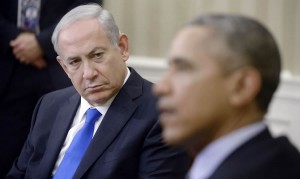Dangerous Times for Israel Demand Renewed American Commitment
The Stream - Monday December 26, 2016
by Rob Schwarzwalder

"The release of atom power has changed everything except our way of thinking," said a troubled Albert Einstein as he contemplated the horror of nuclear weapons. "The solution to this problem lies in the heart of mankind. If only I had known, I should have become a watchmaker.”
Dr. Einstein was right in echoing what the Prophet Jeremiah wrote in the 7th century B.C.: "The heart of man is deceitful above all things, and desperately sick" (Jeremiah 17:9). Like the permanence of human falleness, however, the technology and reality of militarized nuclear power cannot be undone.
When, this week, the United States failed to prevent the United Nations' Security Council from condemning Israeli settlements in "occupied Palestinian territory," the possible use of nuclear weapons became a more vivid fear for the Jewish State, a nation Albert Einstein supported vigorously in its early years.
America's failure to support Israel at a time of enormous crisis in that interminably roiling region sends a signal of weakness.
Attacking Israel has become a cottage industry at what supposedly is the world's forum to prevent international conflict. In November 2015 alone, the United Nations passed no less than 20 resolutions "singling out Israel for criticism -- and only 3 resolutions on the rest of the world combined."
Yet this week's resolution is unique in that given the opportunity, America declined to stop a one-sided, anti-Israel bill from going through the Security Council.
The Connection Between U.N. Action, U.S. Indifference and Nuclear Weapons
So, what's the relationship between the U.N. action, America's indifference to it, and nuclear weapons? First, some background: Israel has control of areas it took from Arab Palestinian control following the 1967 Six-Day War. Its control of this territory is hotly disputed. What is indisputable is Israel's strategic importance to American security interests throughout the Middle East, as is our moral duty to stand by one of our truest allies and friends.
Israel's reaction to America's failure to stand with her was swift and devastating. "Israel rejects this shameful anti-Israel resolution at the U.N. and will not abide by its terms," said Israeli Prime Minister Benjamin Netanyahu said following the vote. "At a time when the Security Council does nothing to stop the slaughter of half a million people in Syria, it disgracefully gangs up on the one true democracy in the Middle East, Israel, and calls the Western Wall 'occupied territory.'"
And in an extraordinary public criticism of President Obama, Mr. Netanyahu said, "The Obama administration not only failed to protect Israel against this gang-up at the UN, it colluded with it behind the scenes. Israel looks forward to working with President-elect Trump and with all our friends in Congress, Republicans and Democrats alike, to negate the harmful effects of this absurd resolution."
Mr. Trump personally intervened earlier in the week in contacting the president of Egypt, whose Security Council representative was planning to offer the measure. Pursuant to the President-elect's call, Egypt agreed to refrain from offering the resolution. Yet four other countries, including American ally New Zealand, took advantage of their outgoing membership on the U.N. Security Council to offer the resolution instead of Egypt.
And the Obama Administration did nothing.
It can be hoped that when Donald Trump takes office, his bold support for Israel will not waver.
Enter the threat of nuclear weapon use. Israel's most intransigent enemy, Iran, may or may not have nuclear weapons. But clearly Iran has been pursuing the development of such for many years, and the deal struck by the Obama Administration with Iran concerning its nuclear program is hardly reassuring to close observers concerned that it contains atomic bomb-size loopholes.
America's failure to support Israel at a time of enormous crisis in that interminably roiling region (Syria, ISIS, and Iran, to name but three continuing thorns in the world's flesh) sends a signal of weakness and, thereby, opportunity for Israel's dedicated foes. Although President-elect Trump promises to restore America's unequivocal allegiance to Israel ("As to the UN, things will be different after Jan. 20th," the Tweetmaster-in-Chief commented last week), the West's cowardly collusion with Israel's enemies (among other Security Council members, France and Britain voted to condemn the settlements) only strengthens the hands of the hard-liners in Iran who want to reduce Israel to a smoking smudge on the map of the world.
A few days ago, Iranian President Hassan Rouhani said, "Today, the world public opinion is faced with this strong argument that the Zionist regime has never been after peace, and this argument and reasoning should be used to show that there is no way, but jihad and resistance for the Palestinians against the usurper regime."
Israel is not for peace, and is a "usurper regime?" This from a man whose government pays for the terrorist group Islamic Jihad's vicious violence against Israel.
Will Iran attack Israel with nuclear weapons tomorrow? No. But do American vacillation and Western anti-Israelism incentivize not only Iranian-sponsored terrorism but, in all likelihood, renewed clandestine efforts by Iran's government to construct nuclear weapons? Almost certainly.
It can be hoped that when Donald Trump takes office, his bold support for Israel will not waver. He has promised to move the U.S. embassy to Jerusalem and to ensure a robust U.S.-Israeli military alliance.
Let us pray that Mr. Trump's commitment to the Jewish state will be dogged. If it is, perhaps Albert Einstein, were he still with us, would be a little less inclined to have been a watchmaker than the founder of modern physics.
Read More Here
No comments:
Post a Comment